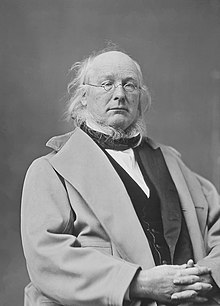Our website is made possible by displaying online advertisements to our visitors.
Please consider supporting us by disabling your ad blocker.
Horace Greeley
Horace Greeley | |
|---|---|
 Greeley, c. 1860s | |
| Member of the U.S. House of Representatives from New York's 6th district | |
| In office December 4, 1848 – March 3, 1849 | |
| Preceded by | David S. Jackson |
| Succeeded by | James Brooks |
| Personal details | |
| Born | February 3, 1811 Amherst, New Hampshire, U.S. |
| Died | November 29, 1872 (aged 61) Pleasantville, New York, U.S. |
| Resting place | Green-Wood Cemetery |
| Political party |
|
| Spouse | |
| Signature | |
Horace Greeley (February 3, 1811 – November 29, 1872) was an American newspaper editor and publisher who was the founder and editor of the New-York Tribune. Long active in politics, he served briefly as a congressman from New York and was the unsuccessful candidate of the new Liberal Republican Party in the 1872 presidential election against incumbent President Ulysses S. Grant, who won by a landslide.
Greeley was born to a poor family in Amherst, New Hampshire. He was apprenticed to a printer in Vermont and went to New York City in 1831 to seek his fortune. He wrote for or edited several publications, involved himself in Whig Party politics, and took a significant part in William Henry Harrison's successful 1840 presidential campaign.
The following year, Greeley founded the Tribune, which became the highest-circulating newspaper in the country through weekly editions sent by mail. Among many other issues, he urged the settlement of the American Old West, which he saw as a land of opportunity for the young and the unemployed. He popularized the slogan "Go West, young man, and grow up with the country."[a] He endlessly promoted radical reforms such as socialism, vegetarianism, agrarianism, feminism, and temperance and hired the best talent that he could find.
Greeley's alliance with William H. Seward and Thurlow Weed led to his serving three months in the U.S. House of Representatives, where he angered many by investigating Congress in his newspaper. In 1854, he helped found the Republican Party. Republican newspapers across the nation regularly reprinted his editorials. During the Civil War, he mostly supported President Abraham Lincoln but urged him to commit to the end of slavery before Lincoln was willing to do so. After Lincoln's assassination, he supported the Radical Republicans in opposition to President Andrew Johnson. He broke with the Radicals and with Republican President Ulysses Grant because of the party's corruption and Greeley's view that Reconstruction-era policies were no longer needed.
Greeley was the new Liberal Republican Party's presidential nominee in 1872. He lost in a landslide despite having the additional support of the Democratic Party. He was devastated by the death of his wife five days before the election and died one month later, prior to the meeting of the Electoral College.
Cite error: There are <ref group=lower-alpha> tags or {{efn}} templates on this page, but the references will not show without a {{reflist|group=lower-alpha}} template or {{notelist}} template (see the help page).
Previous Page Next Page


